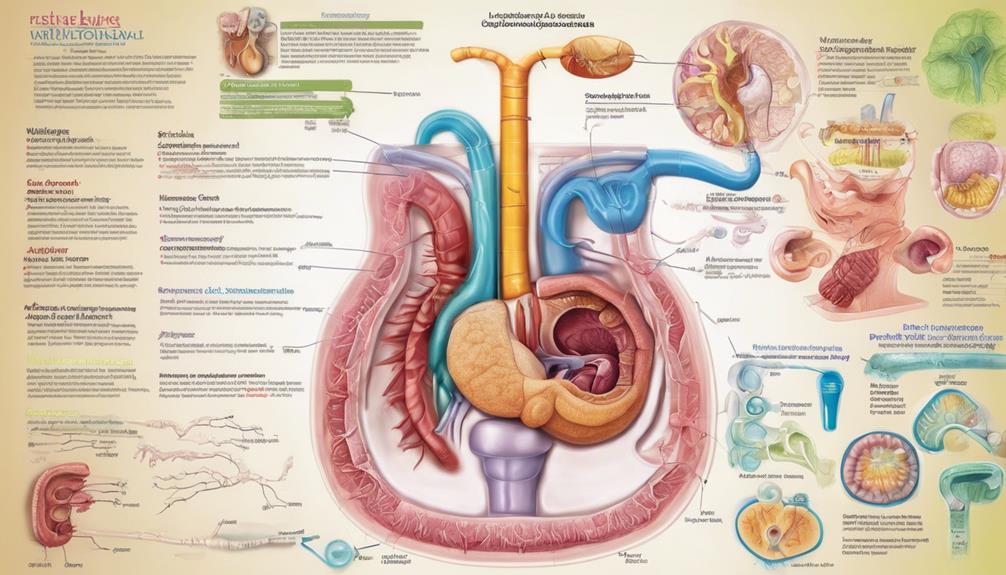Constipation happens when we have infrequent or hard stools. It can be due to not eating enough fiber, not drinking plenty of fluids, or not being active. Symptoms include belly discomfort and rare bowel movements. Diagnosing it involves checking symptoms, doing physical exams, and reviewing medical history. Treatments involve lifestyle changes, medication, and fiber intake. Preventing constipation means eating fiber-rich foods, staying hydrated, and being active. Developing a routine for bowel movements can help. Understanding constipation causes, symptoms, diagnosis, treatment, and prevention is essential for managing it effectively. More helpful details await for a deeper understanding.
Key Takeaways
- Inadequate fiber intake, low fluid consumption, and lack of physical activity contribute to constipation.
- Symptoms include infrequent bowel movements, abdominal discomfort, straining, and incomplete evacuation.
- Diagnosis involves symptom assessment, physical exams, blood tests, imaging studies, and procedures like colonoscopy.
- Management includes lifestyle changes, dietary fiber, water intake, physical activity, and medications as needed.
- Prevention strategies focus on high-fiber diet, hydration, physical activity, regular bowel habits, and avoiding stool holding.
Constipation Overview
Constipation is a common digestive issue that affects many individuals worldwide, causing discomfort and difficulty in passing stool. When our bowels move slowly, it can lead to infrequent or hard stools, making it challenging to go to the bathroom.
The colon and rectum play essential roles in the digestive process, helping to absorb water and nutrients while forming waste into stool. Factors like inadequate fiber intake, low fluid consumption, and lack of physical activity can contribute to constipation by slowing down bowel movements.
Ensuring a diet rich in fiber, staying hydrated, and engaging in regular exercise are vital in preventing and managing constipation. Seeking medical advice is important if constipation becomes chronic or severe, as it can be a sign of underlying medical conditions.
Symptoms and Causes

Experiencing infrequent bowel movements and abdominal discomfort are common indicators of constipation, highlighting the need to understand its symptoms and underlying causes.
Symptoms of constipation include difficulty passing stool, bloating, and a feeling of incomplete evacuation. Causes can range from slow transit time in the colon, lifestyle factors such as inadequate fluid intake and a low-fiber diet, to issues with pelvic floor muscles. Slow movement of stool through the colon leads to excessive water absorption, resulting in hard, dry stools characteristic of constipation.
In addition to abdominal pain, individuals may experience straining during bowel movements and a sense of incomplete bowel evacuation. Identifying the root causes of constipation is essential for effective management and treatment. Factors like nerve dysfunction, certain medications, diabetes, and hormonal imbalances can also contribute to constipation.
Understanding these symptoms and causes is essential for addressing and preventing constipation through appropriate lifestyle changes and targeted treatments.
Diagnosis and Testing
Understanding the diagnostic process for constipation involves a thorough assessment of symptoms, physical examination, and a detailed review of medical history. In addition to these initial steps, further tests may be necessary to pinpoint the underlying cause. Blood tests can help identify any potential imbalances or conditions contributing to constipation.
Imaging studies like anorectal manometry and colonic transit studies provide valuable information about how the muscles and nerves in the digestive system are functioning. Procedures such as barium enema, colonoscopy, and sigmoidoscopy allow healthcare providers to visually inspect the colon and rectum for abnormalities that could be causing constipation.
Management and Relief

Implementing lifestyle changes and incorporating appropriate medications are key components in effectively managing and finding relief from chronic constipation. Dietary fiber, found in fruits, vegetables, and whole grains, can help soften stool and promote regular bowel movements.
Making lifestyle changes such as increasing water intake, engaging in regular physical activity, and practicing stress management techniques can also aid in relieving constipation. Over-the-counter laxatives and fiber supplements are options for immediate relief, but addressing underlying causes for long-term management is important.
Creating a comfortable environment in the bathroom and establishing a consistent bowel movement schedule can contribute to effective management of constipation. Seeking medical guidance is vital, especially for chronic constipation or if lifestyle changes alone aren't providing relief.
Prevention Strategies
To prevent constipation, maintaining a diet rich in high-fiber foods like fruits, vegetables, and whole grains is essential. Fiber helps promote regular bowel movements, preventing constipation by aiding in the timely elimination of waste.
Additionally, staying hydrated by drinking an important amount of water throughout the day is critical for healthy digestion and preventing constipation.
Physical activity and exercise play an important role in preventing constipation as well, as they stimulate bowel movements and support proper colon function.
Developing a routine for passing stools can train your body to have regular bowel habits, further aiding in the prevention of constipation. It's important to listen to your body and avoid holding in stool when you feel the urge to go. In addition, incorporating a diet high in fiber and staying hydrated can support healthy bowel movements. Engaging in regular physical activity can also help stimulate the digestive system, promoting regularity. In cases where bowel control becomes challenging, some individuals may explore solutions such as understanding **why adults wear diapers** to manage incontinence issues and maintain comfort in their daily lives.
Frequently Asked Questions
What Simple Trick Empties Your Bowels Immediately?
Drinking warm liquids, like herbal tea or hot water, can swiftly empty our bowels. This simple trick stimulates bowel movements, aids digestion, softens stool, and relaxes the digestive system. It's a quick and effective way to relieve constipation and improve bowel regularity.
What Are the Causes and Prevention of Constipation?
Understanding constipation can result from low fiber, dehydration, inactivity, meds, or health issues. To prevent it, we prioritize fiber-rich foods, hydration, activity, and addressing any health concerns. Let's tackle this together!
What Are the 10 Most Constipating Foods?
We've identified some common constipating foods: processed fatty foods, dairy products like cheese, fatty red meats, refined grains such as white rice and bread, and low-fiber bananas. Avoiding these can help prevent constipation.
What Are the 3 F's of Constipation?
Oh, constipation, the 3 F's – frequency, form, fullness! We track how often we go, what it looks like, and that unsatisfying feeling after. Less than three times a week? Yeah, we're in the constipation club.
Conclusion
To sum up, constipation is a common condition that can be triggered by a variety of factors such as diet, lack of exercise, and certain medications. It's crucial to recognize the symptoms, seek medical advice for proper diagnosis, and follow treatment options like dietary changes and increased water intake.
For instance, Sarah struggled with constipation due to a diet low in fiber, but after incorporating more fruits and vegetables into her meals, she found relief and improved bowel movements.
Remember, prevention is key to maintaining good digestive health.









